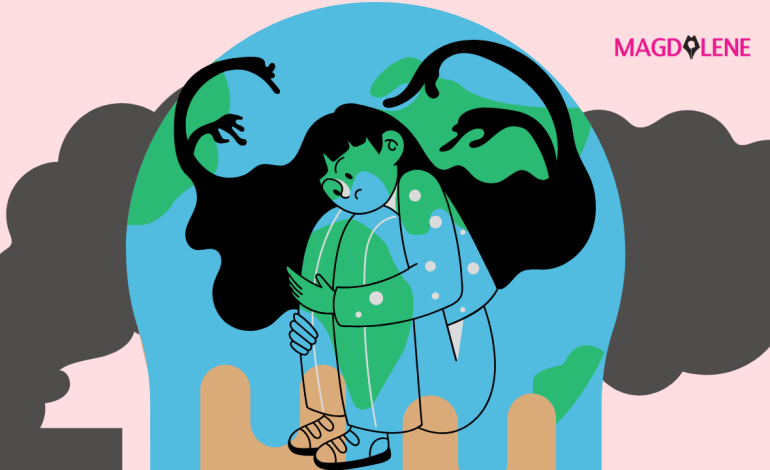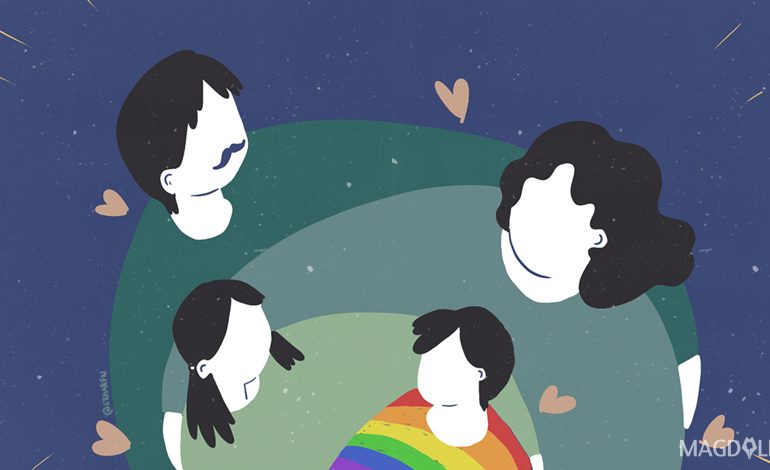I Talked to 1,000 People from Around the World About Eco-Anxiety: It’s A Collective Trauma

Six out of nine planetary boundaries for the liveable environmental niche are crossed, as North America and parts of Asia bake, Nigeria and Brazil flood, and Filipinos flee homes buffeted by another intense typhoon. I am thus worried about the people who are not feeling worried about the state of the environment right now.
A Proliferation of Definitions
Google searches for the terms eco-anxiety and climate anxiety have risen by 4,590 percent between 2018 and 2023. What these experiences mean and for whom, and whether they could help catalyse climate action, are questions that I have spent the past years investigating as part of my work leading the Climate Cares Centre at Imperial College London.
Also read: 6 Books To Help Talk To Your Child About Climate Change
So what is eco-anxiety? To begin with, the term broadly refers to distress around destruction of the environment (and the consequences for human and non-human life), while climate anxiety points to such distress as it pertains to climate change. From the first documentation of eco-anxiety in 2007, there has been an explosion in academic and popular media articles on the topic. There has been a proliferation of scales, of definitions, and of other related terms like climate anxiety or ecological grief. Alongside validated tools to measure eco-anxiety, there are also now “climate worry”, “climate anxiety” and “climate distress” scales, among others measuring a suite of cognitive, behavioural, affective and functional symptoms, many created and primarily tested in Global North countries.
In academic literature, eco-anxiety has been variably defined as “a chronic fear of environmental doom”, “a severe and debilitating worry related to a changing and uncertain natural environment”, and “various difficult emotions and mental states arising from environmental conditions and knowledge about them”. In practice, many people use it to describe a whole range of emotional states other than anxiety, including grief, anger, or guilt, or feeling overwhelmed, powerless and hopeless.
Fears More Acute in Countries Hit By Climate Chaos
Such strong emotional responses to ecological destruction are understandable and even perhaps appropriate, and yet they are not universal. Indeed, looking at the watering down of climate pledges from fossil fuel executives as their profits soar, you’d be forgiven for thinking that concern about creating a liveable future for humanity was the last thing on the minds of people leading many industries and governments. Others have argued to me that when you are living hand to mouth, as many are with the cost of living crisis, you don’t have time to worry about rising global temperatures, or indeed that eco-anxiety applies to overly worried children who have it easier today than in previous times of world war or the cold war.
Do they have a point? Are “eco-anxiety” and “climate anxiety” the preserve of pampered youths who, as the naysayers would put it, need to get a grip?
I can definitively say that this doesn’t correspond to my experience of listening to the stories of people already living with the impacts of the climate and environmental crises. Over the last couple of years, I had the privilege of learning from the experiences and insights of nearly 1,000 people across 90 countries as part of Connecting Climate Minds, a Wellcome-funded global initiative to build an aligned agenda for research and action in climate change and mental health. This included young people, Indigenous communities, and small farmer and fisher peoples, as well as researchers, policy-makers, civil society leaders, healthcare practitioners, and those involved in climate action. For many if not most of the people we spoke with, the climate crisis is a daily reality fuelling concerns over what is to come.
Also read: New Data: Climate Change Is Intensifying the Water Cycle, More Flooding
The stats back this up. In our data with nearly 3,000 young people across the USA, those who self-report direct experience of climate change have higher eco-anxiety scores – though, of course, the cause and effect of self-report is hard to untangle. In worldwide data, however, fear for the future also appears to be higher in countries already more affected by climate change – for instance 84 percent of 1,000 young people surveyed in the Philippines in 2021 were very or extremely worried about climate change, versus 58 percent in France – and groups already bearing the highest cost and/or with strong connections to the land, including Indigenous communities and the younger generation inheriting the crisis.
These groups face the most injustice and yet wield the least power to effect change. In the words of one young person in the Connecting Climate Minds youth dialogues, as a result of escalating climate disasters: “The future is not bright. It is black, rather than bright”, while a participant in the Connecting Climate Minds Latin America and the Caribbean dialogue reported that a girl had told them she wanted to “drop out of medical school because [she was] going to make people live longer and the planet is going to suffer”.
Descriptions of the mental health and wellbeing-related symptoms related to climate change vary widely across contexts, and depending on familiarity with different terminologies, may or may not be described as “eco-anxiety” by those affected. People affected by climate-related stressors spoke about a lack of sleep, headaches, depressive feelings and even suicide, with variation on who used the term eco-anxiety, though most regions did find it important. Is the distress felt by all of these peoples – across cultures and contexts – really “eco-anxiety”? Is it helpful to label it as such?
Like with many labels, some people we speak to find it extremely helpful to have a term to describe and validate their experience. For instance, Jennifer Uchendu, the founder of Sustyvibes, a youth climate action group in Nigeria and Ghana, shared that “having a name for these strong emotions has been very powerful for me and many young people I work with in Africa, we always knew the state of the planet was impacting psychologically but often struggled to describe our feelings”.
Collective Trauma, Individual Experiences
However, some worry that the term eco-anxiety will be used to individualise or pathologise an issue that has its roots not in an individual, but in wider society, where it’s a collective trauma and a response to a perceived existential threat. As a term centring “anxiety”, it can also risk masking the many nuanced and powerful emotional and psychological responses to the climate crisis, and what this looks and feels like for communities where climate change is an extension of colonialism and is an exacerbation of enormous injustices. For instance, early research suggests that a related term, solastalgia, which refers to distress felt in relation to environmental decline in one’s home environment, a homesickness felt while still being at home, does not fully capture the experience of Pacific Island communities for whom “land loss equates to a loss of culture, identity, well-being, and kinship”.
An Indigenous participant in Connecting Climate Minds, also shared the challenges that anxiety and other mental health-related terminology can hold:
“Uncertainty is helpful as it allows us to fall into our elders, into our community. But anxiety is a western construct. The language of management, the language of crisis is not our language. That terminology of anxiety needs to go in a box somewhere. Important distinction.”
Emerging psychological models that contextualise mental health “symptoms” as understandable responses to experienced threats embedded in power structures – such as the Power Threat Meaning Framework – have noted
“labels such as ‘climate anxiety’ or ‘solastalgia’ may, unless used with care, serve to disconnect threat responses from threats, rendering them unintelligible”.
Importantly, experiencing the escalating extreme weather and climate effects – and their destabilising influences on food and water security, livelihoods, healthcare, education and whole communities, is related to a whole range of mental health outcomes far beyond what is generally meant by eco-anxiety, including suicide, post-traumatic stress, depression, substance misuse and anxiety. People living with mental health challenges can be particularly vulnerable to climate change impacts, including higher chances to die in extreme heat. And while eco-anxiety itself is not a sign of being mentally unhealthy, it is a stressor that can worsen mental health and wellbeing, and its relevance for mental health systems is hotly debated. While for some people it is manageable, for some it can impair relationships and their ability to function.
Is Eco-Anxiety Good for the Environment?
Anecdotally, when asking members of the UK public to identify their emotions about the climate crisis during public engagement activities conducted in 2023, the most frequent feeling was “powerlessness”. It is this powerlessness/helplessness and hopelessness that has been linked both to lower wellbeing and less helpful behaviour toward the environment.
Is the converse true? Are there people who can express high distress about the state of the environment and lead sustainable lives? Could there be such a thing as a “healthy, non-pathological” anxiety serving an adaptive purpose, such as taking action for the environment? Yes, many have argued, including a team of Australian researchers in May 2024, but this depended on context, resources and what actions one is talking about. As “eco-anxiety” is really a whole constellation of symptoms, when looking at the nuances of the experience researchers found that “worry” or “rumination” about the environment predicts pro-environmental behaviours, but a bigger emotional or behavioural burden of eco-anxiety (like poorer sleep and emotional distress) did not.
As the authors said:
“When eco-anxiety impairs a person’s sleep, social interactions, and work/study, their capacity to make environmentally friendly lifestyle choices is reduced.”
But the rumination and behavioural aspects of eco-anxiety were themselves correlated, highlighting the need for greater research and understanding, while also highlighting the inherent messiness of the experience in even a single individual.
Also read: Food Expiration Dates Don’t Have Much Science Behind Them
We all respond psychologically to the climate crisis, and even counterproductive responses such as denial can be part of a defence mechanism to feel safe in an unsafe climate, or to distance ourselves from uncomfortable realities. There is value in creating psychologically safe opportunities for conversations about what we really value and care about saving in a world that will and must change. People generally care far more than we think they do, and the majority globally would even contribute from their salary to climate action.
From our different standpoints, we can all contribute to creating enabling environments for action at all levels – legally, culturally, scientifically, socially – that are better for our health and the climate. Talk about how you feel and invest wisely – from the employee lounge to the boardroom – and help reach social “tipping points” before we reach more climate tipping points.
Learning to Live with Uncertainty
Fundamentally, distress about climate change would be significantly reduced through proportionate and visible action from leaders who hear and act on the voices of those affected. I strongly believe that the best mental health intervention in the climate crisis is a fast, fair and funded phaseout of fossil fuels. But as most don’t have the luxury of avoiding the consequences of an increasingly chaotic climate, it’s worth noting that the skills we need to live well in the climate crisis, cope with eco-anxiety and take transformative action – rather than be frozen, overwhelmed, burned out or numb – are strongly aligned with what we need to learn to live well in general. Certain reflective practices can help us cope constructively with eco-anxiety and also strengthen mental health in general.
So maybe there is value in embracing the mess. The unfolding complexities of nuanced stories and data. The experience of navigating both transformative systems change and renewal, and climate and ecological breakdown, that are happening simultaneously. Holding grief, despair, fear, hope and joy together. Taking comfort in a distress that highlights a care and compassion for the world, a sense that things are not right, but in that knowing can be made better. Cultivating a tolerance for uncertainty that can help reduce anxiety, and protect against the falsehoods of doomism.
In the words of Rebecca Solnit:
“What motivates us to act is a sense of possibility within uncertainty – that the outcome is not yet fully determined and our actions may matter in shaping it.”
By forging a deep and widespread connectedness, a belonging together in these challenging but understandable feelings that come from living in a climate held hostage to the profit margins of fossil fuel executives, we can multiply and sustain such transformative actions.
Created in 2007 to help accelerate and share scientific knowledge on key societal issues, the Axa Research Fund has supported nearly 720 projects around the world conducted by researchers in 39 countries. To learn more, visit AXA Research Fund or follow on Twitter @AXAResearchFund.
Emma Lawrance, Lead Policy Fellow for Mental Health, Imperial College London
This article was first published on The Conversation, a global media resource that provides cutting edge ideas and people who know what they are talking about.






















